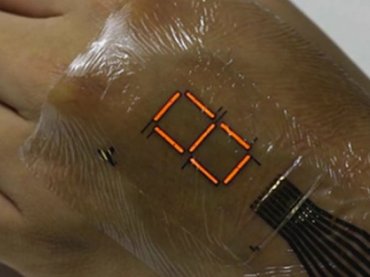
- A-
- A
- A+
Super-thin electronic skin lights up a digital display on your hand
Imagine having a fitness tracker that doubles as a temporary tattoo. Or a monitoring device that doctors can paste straight onto an ailing organ. Or a watch so unobtrusive that it looks like it's built right into your wrist. These are all long-term possibilities for electronic skin (or e-skin) — ultra-thin and ultra-stretchy material that can mimic the flexibility of human skin. New e-skin research is happening all the time, but today, researchers at the University of Tokyo are introducing a new method of turning it into an electronic display.
In a study published in Science Advances, researchers created organic polymer light-emitting diodes (PLEDs) — small sheets of energy-efficient lights — in three colors: red, green, and blue. When hit with electrical pulses, these lights can turn on and off, mimicking pixels on a normal screen. In one photo, for example, you can see blue PLEDs in a University of Tokyo logo that light up and dim at different power levels.
Arrangements of PLEDs can also display more complex information. Below, you can see seven red bars that form letters and numbers, like a calculator screen on your hand.
Similar News
Links



 Elm TV
Elm TV
 Photo
Photo
 Video
Video





